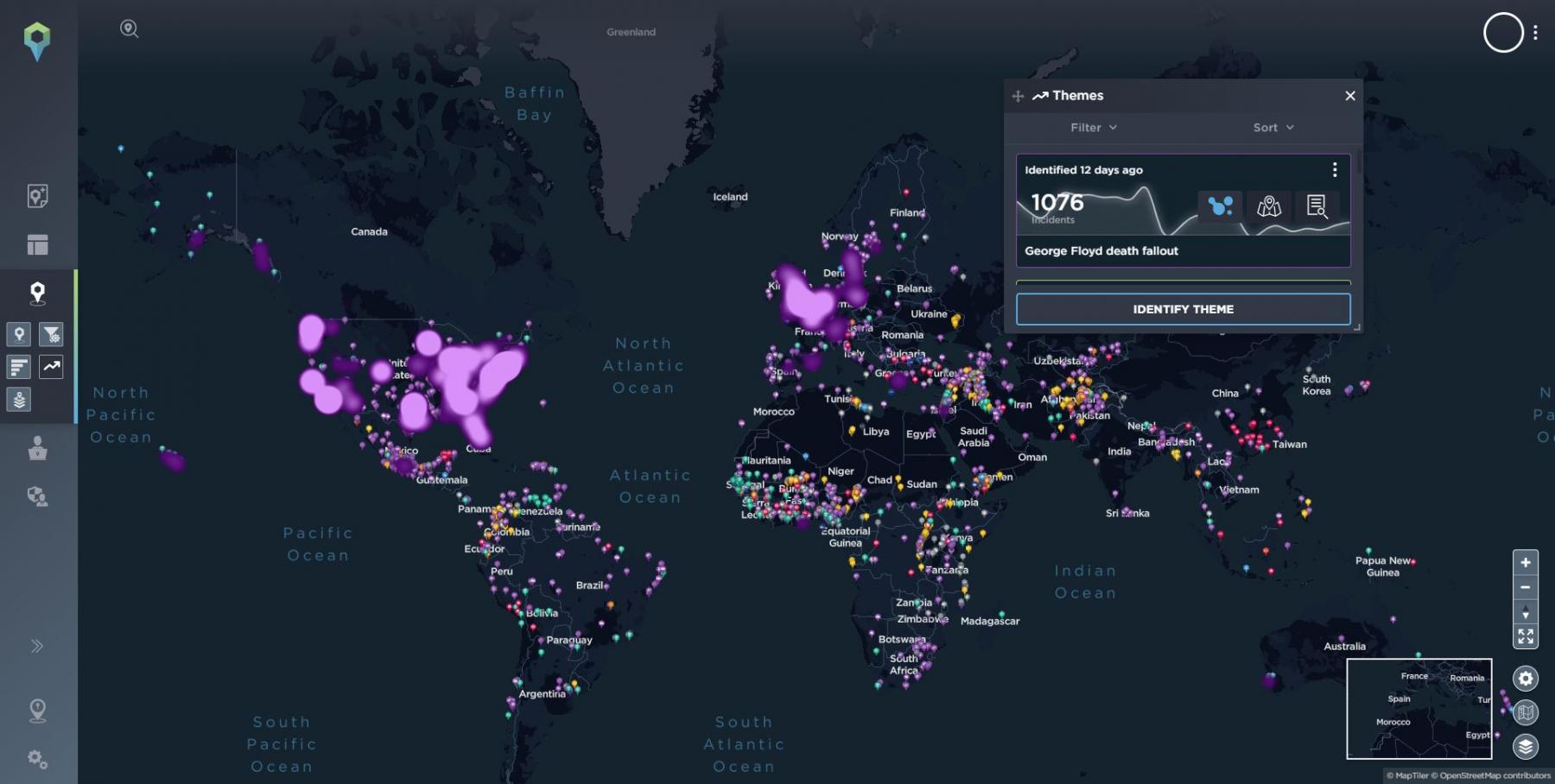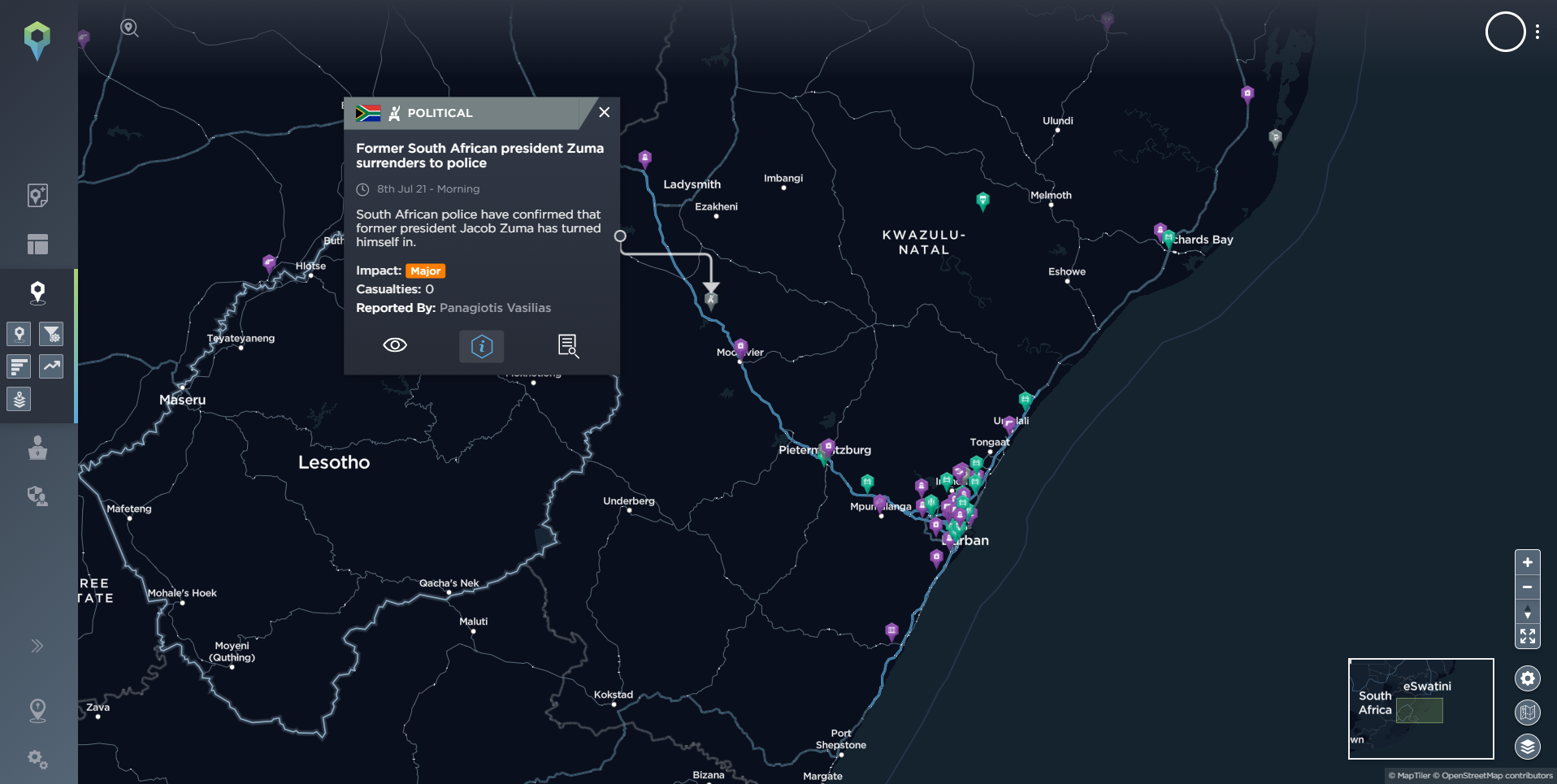What is the impact of load shedding in South Africa?
Load shedding in South Africa: What is the electricity crisis?
South Africa is experiencing high stages of load shedding affecting businesses and society. In an attempt to prevent the collapse of the electrical grid, Eskom (national public electricity utility) has implemented rolling blackouts. The load shedding schedule is divided into 8 different stages, with each stage increasing the number of hours per day that the electrical supply will be turned off. Earlier in 2023, load shedding reached stage 6, with power outages of at least 6 hours a day.
Rolling blackouts are expected to last for the remainder of the year. President Ramaphosa described rolling power cuts as an existential threat to the economy and social fabric of the country.
The electricity crisis has heavily impacted business and the economy and is feeding existing political and societal ruptures.

The image shows the impact of the outages resulting in increased criminality and political demonstrations [image source: Intelligence Fusion].
What is the economic impact of load shedding?
The ongoing energy crisis is hindering the economic growth of the country. The second quarter of 2022 showed that the country’s GDP decreased by 0.7%. South Africa’s chance of a recession in 2023 is 45%, with the economy unlikely to grow by 0.3% each quarter. Economists predict that the GDP of 2023 will decrease to 1.2% from 2.3% in 2022.
Load shedding has affected South Africa’s economic recovery as the power cuts cost the country between 204 million rand (USD 11,281,997.64) and 899 million rand (USD 49,773,519) per day.
What are the wider infrastructure challenges?
South Africa is facing wider infrastructure issues. There have been ongoing rail disruptions caused by the lack of spare parts for trains and security to run them.
A 2022 report on infrastructure in South Africa assessed that 15 of the 32 infrastructure segments are satisfactory. The overall rating of the infrastructure was a D, meaning that it is poorly maintained and not coping with the normal demand. The SAICE claims this infrastructure is potentially a severe inconvenience and/or danger to the public if no action is taken.
How is load shedding impacting small businesses?
Small businesses have had to adjust operating hours to accommodate the load shedding schedule. Loss of planning, low staff morale, theft increases, loss of internet connectivity, payment processing disruption and broken equipment are other ways small businesses have been affected. The increased cost of doing business has led to companies letting go of staff, whilst others have been pushed to the brink of closure. A Small Enterprise Finance Agency (Sefa) and Ministry of Small Business Development survey found that 71% of businesses have been negatively affected by load shedding.
![The image shows some of the disruptions that have occurred due to the planned blackouts [image source: Intelligence Fusion].](https://www.intelligencefusion.co.uk/wp-content/uploads/2023/03/image8.png)
The image shows some of the disruptions that have occurred due to the planned blackouts [image source: Intelligence Fusion].
Affected Sectors
What's the government’s response to the crisis?
In response to the crisis, a state of disaster was declared, and a minister of electricity was appointed within the presidency. With the implementation of the state of disaster, the government intends to respond to the crisis with fewer bureaucratic delays.
The National Executive Committee strategic planning meeting stated that in order to rebuild, save and protect Eskom, it would require a reallocation of the national budget. The national budget is already strained by a growing welfare state at a time when the emigration of skilled and high-income earners poses a threat to the tax system, according to Standard Bank Group.
Whilst the state of disaster has been implemented, prior experiences of this have not been positive. The state of disaster could lead to an increase in maladministration, corruption and unauthorised expenditures. Some also believe that adding the position of minister of electricity will add to bureaucracy.
Pravin Gordhan stated that Eskom is heavily impacted by corruption within the company. Gwede Mantashe, an influential figure with the ANC, stated that there are multiple actions that need to be taken in order to end load shedding within the next 6-12 months: power should be imported from neighbouring countries, employ more skilled employees and an urgency to repair its coal-fired plants.
As part of the state of disaster, the government will also offer more support to farmers, food processors and distribution and logistics companies while also exempting critical infrastructure from load shedding. In order to combat problems within the energy sector, Ramaphosa has organised the National Energy Crisis Committee. The purpose of the NECOM is to ensure that the Energy Action Plan, announced by Ramaphosa on the 25th July 2022, is implemented quickly and that the government’s response is coordinated effectively.
The Energy Action Plan has a number of measures that are designed to assist in the betterment of the sector. These include private sector investment in the generation of energy, and there is an emphasis on renewable energy.
ANC (African National Congress)
The latest polls show that electoral support for the ANC has dropped to new lows. Divisions are also forming within the party. Members of the party loyal to the ex-president Jacob Zuma are leaving the party to form a far-left movement known as the Radical Economic Transformation Movement (RETMO), formed by Carl Neihaus. RETMO is seeking to topple Ramaphosa in the 2024 elections. If influential members of the ANC, like Ace Magashule, join RETMO, this could take away from their voter base.
EFF (Economic Freedom Fighters)
In response to the crisis and the decisions of the ANC, the EFF held a national shutdown on the 20th March. The EFF is calling for the resignation of President Ramaphosa and for a reliable electricity supply. The EFF held protests in major cities, such as; Durban, Cape town, Bloemfontein, Pretoria and Johannesburg.
The national shutdown has been described as only the beginning, and they are calling for intensified efforts to get President Ramaphosa to resign.
![The image shows demonstrations that may impact businesses, assets and people [image source: Intelligence Fusion].](https://www.intelligencefusion.co.uk/wp-content/uploads/2023/03/image4.png)
The image shows demonstrations that may impact businesses, assets and people [image source: Intelligence Fusion].
DA (Democratic Alliance)
On 25th January, the DA declared a National Day of Action against the ANC’s load shedding and their unaffordable electricity price increases. The DA has stated that it will challenge the declaration of a state of disaster in court, claiming that the ANC has issued “nonsensical regulations and abused procurement processes during the pandemic”. The DA has released a list of solutions to address the electricity crisis.
What is the social impact of load shedding?
Civil unrest
Planned and unplanned protests have taken place in response to the ongoing electricity crisis, affecting other service delivery.
The protests varied in size depending on the area where they were held. In major metropolitan areas, protests with a larger turnout were seen. In most cases, these protests were peaceful, with minor disruptions affecting traffic and service delivery, with rare cases of violence and looting reported. Public service workers held strikes calling for a wage increase, and unions such as; SAPU and NEHAWU have joined the strikes.
There was a marked increase in protests in March 2023:
![The image shows an increase in protests and demonstrations in March 2023 [image source: Intelligence Fusion].](https://www.intelligencefusion.co.uk/wp-content/uploads/2023/03/image5-1.png)
The image shows an increase in protests and demonstrations in March 2023 [image source: Intelligence Fusion].
Inequality
There is a likelihood that these blackouts will worsen inequality within the country, with many higher-income areas reportedly not receiving the same harsh rolling blackouts as other lower-income areas. Higher-income households are also more resilient to the effects of power outages. Load shedding is also leading to unemployment, or wage freezes as companies cut costs to stay afloat and to deal with the inevitable drop in productivity.
Power cuts are also affecting people’s ability to study or look for employment. For one gigabyte of data, people are paying 85 rand, which is the equivalent of four hours of work for people earning minimum wage.
Racial Tension
Due to the increased number of protests being reported around the country, it is likely to lead to an increase in racial tensions or xenophobic attacks, particularly if there is a breakdown in law and order, as was the case in 2021 in areas including Durban where law enforcement’s inability to cope with looting led to communities resorting to vigilantism. Tensions may be higher since the planned national shutdown that occurred on the 20th March by the EFF or if there is a total grid collapse.
Households
Load shedding is impacting households in a variety of different ways. Food inflation reached a 14-year high, partly due to the Ukraine war and COVID-19, and prices could spike if sustained load shedding continues. Household electricity appliances and devices are affected in a variety of ways, with some posing a fire risk. An increase in fires at formal structures in Johannesburg has been associated with increased power outages. Informal settlements are also at risk.
Crime
There is a known link between power outages and increased crime, causing concern to businesses and households.
Increased crime has been observed in higher-income areas, however, the number of crimes in lower-income areas is also increasing. Businesses or households without back-up power systems are particularly exposed as their alarm and/or CCTV systems are not functional at all times. Additionally, security companies have stated that criminals may be taking advantage of security systems being damaged by the continual power outages.
Increased crime can be offset through increased visible policing, and businesses or households could employ private security. However, police are largely dependent on street lighting, an effective crime prevention measure. What’s more, electrical infrastructure has been targeted by cable thieves during load shedding. In December 2022, the theft of electrical cables led to a loss of supply to customers in the town of Darnall in KwaZulu-Natal.
![The image shows increased burglary and theft in the area due to load shedding [image source: Intelligence Fusion].](https://www.intelligencefusion.co.uk/wp-content/uploads/2023/03/image9.png)
The image shows increased burglary and theft in the area due to load shedding [image source: Intelligence Fusion].
The decline of policing in South Africa has been well documented. Research by Lizette Lancaster of the Institute for Security Studies found that the police’s ability to solve murders declined by 38% in the past decade since 2011/2012.
The Head of Justice and Violence Prevention at the Institute for Security Studies, Gareth Newham, has stated that over the past five years, there has been a decline in the police’s ability to solve armed robberies and tackle organised crime. An increase in attacks on police stations during rolling blackouts is another concern, as it leaves people and businesses vulnerable to crime.
In conclusion, South Africa is being negatively affected by the load shedding as it is impacting various economic, public and private sectors throughout the country. With the ongoing energy crisis, we are likely to see a continuation of the civil unrest through protests and increased political and racial tensions across the country.
At Intelligence Fusion, we help transform the risk management practices of organisations by providing them with unrivalled situational awareness via our threat intelligence platform. We track and accurately geolocate, among other things, crime, unrest and hazards across the globe in near-real-time, as well as the impact of the changing threat landscape on businesses, governments and the military.
To understand further benefits of the platform, speak to a member of the team today.
Book a demo


